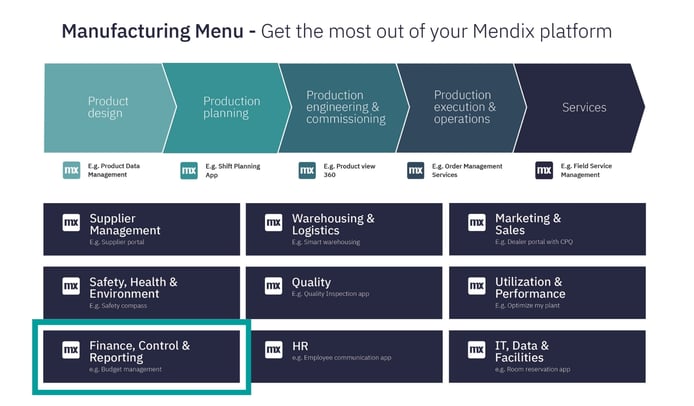Manufacturing Menu: Master Cash Flow with Financial Management
Last edited on Aug, 14 2024 08:35:02 AM
Reading time: 6 minutes
Written by Chelsea Delich
Table of contents

Although manufacturing companies are primarily producers, good financial management (invoicing, accounts payable, accounts receivable, bookkeeping, payroll, cash management, banking, planning, budgeting, reporting) is an essential part of doing business. The control of cash flows in and out of an organization is a prerequisite for solvency, business continuity, cost optimization, productivity and a strong competitive position. This is why financial management is also a key element within Exima's manufacturing menu. Control and reporting are two core elements at the heart of good financial management. They provide transparency, structure and accountability, allowing you to get and keep a grip on your financial processes, transactions and buying and selling strategy.
As a general rule, the larger, more complex and more diverse a company is, the more difficult it is to manage its finances accurately. However, modern IT technology offers fantastic opportunities to professionalize your budget management and use a data-driven approach to make operational costs and business results easier and faster to understand. That is why this is a regular feature of the Manufacturing Menu.
About the Manufacturing Menu
The Manufacturing Menu addresses all stages and areas of production within manufacturing companies, focusing on specific challenges. It offers practical solutions to promote agility, innovation, and adaptability through Mendix's low-code platform. In this article, you will discover solutions focused entirely on perfecting your financial management.

This blog is part of the series: "Manufacturing Menu: Practical Solutions for the Manufacturing Industry" If you are also want to make the most of your resources and performance with the best utilization and performance tools, we invite you to read this blog as well. Discover more here.
The Value of Financial Management
Financial management is an important part of your overall business for a number of reasons. Here are the reasons why.
Keeping Your Business Solvent
Good financial management keeps a business solvent and therefore has a direct impact on the survival of your manufacturing business. It addresses the issues that threaten your financial health. Examples include an unexpected loss of revenue, inefficient processes and (too) low profitability of certain services or products.
Contributing to Growth & Success
Finance teams within a manufacturing company have several options and tools that can help drive business growth. Examples of knobs they can turn include attracting new funding, upgrading equipment and making processes more cost effective (e.g. by investing in automation). In less favorable times, they may consider closing or downsizing unprofitable manufacturing sites.
Maximizing Profitability
By working with marketing and sales teams to set the right prices for services and products and eliminating unprofitable variants, good financial management helps maximize the profitability of your manufacturing business.
Minimize Costs
Balanced financial management helps you monitor expenditure and identify which items and processes you are spending too much on. It provides opportunities to reduce overheads and therefore costs.
Ensure Liquidity
Good financial management, for example through sound cash forecasting, helps you to keep sufficient cash on hand. Ideally, this will leave you with money not only to continue operating, but also to invest in further growth.
Budget Management
Budget management is an important part of financial management, providing insight into operational costs and business results. Finding the right balance between the two is the path to success and future-proof competitiveness.
Customer Case Modiform - Unifying Fragmented Data for Strategic Insight
 Modiform, a leading player in the horticultural industry, embarked on a transformational journey to address key operational challenges through digitalization. Faced with the pressures of an evolving market, Modiform wanted to improve information delivery, automate financial processes and optimize supplier relationships.
Modiform, a leading player in the horticultural industry, embarked on a transformational journey to address key operational challenges through digitalization. Faced with the pressures of an evolving market, Modiform wanted to improve information delivery, automate financial processes and optimize supplier relationships.
With Emixa's expertise, Modiform strategically deployed low-code solutions to revolutionize its operations. Automated product data maintenance not only increased efficiency, but also minimized errors, allowing Modiform to quickly adapt to market changes. At the same time, streamlined financial planning processes and the implementation of a supplier relationship management system strengthened Modiform's resilience and agility.
The results of this collaboration reflect a remarkable increase in efficiency, accuracy and strategic decision-making, demonstrating Modiform's successful embrace of digital transformation.
Want to Take Your Financial Management to the Next Level?
Good financial management is a prerequisite for continuity and success in the manufacturing industry, but it is also a challenge for many companies. Do you need a good financial management solution to help you keep track of operational costs and business results? Curious about how we leverage our knowledge of low-code, Mendix, digital twinning, plant simulation, and Siemens technology can help you with this? Feel free to contact us to explore the possibilities.
Explore the Manufacturing Blog Series
This blog is part of the Manufacturing Menu blog series, which you can view here:
Last edited on Aug, 14 2024 08:35:02 AM
Reading time: 6 minutes
Written by Chelsea Delich
Also see..
OverviewManufacturing Menu: A Strong Foundation for the Perfect Product
Before a product reaches the market, a manufacturing company must go through various preparatory...
Read more ⟶Manufacturing Menu: Smart Solutions for Future Warehouse Management
In the dynamic world of logistics and warehouse management, companies face the challenge of...
Read more ⟶Manufacturing Menu: Enhance Your Business with Streamlined Processes
While manufacturing companies are primarily focused on production, they can only execute their core...
Read more ⟶

